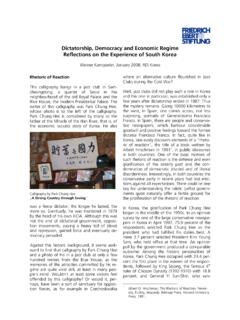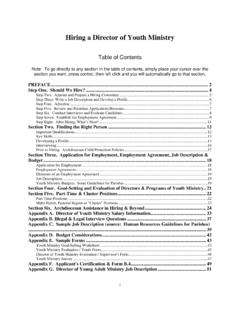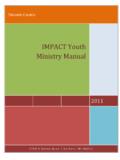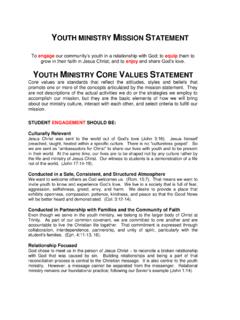Transcription of Youth leadership training program (YLTP): reference ...
1 0 Youth leadership training program (YLTP) reference Material on Introduction to leadership Prepared by Business and Personal Development Addis Ababa August, 2008 1 COPYRIGHT FRIEDRICH-EBERT-STIFTUNG 2008 Addis Ababa Office 8786 Addis Ababa Ethiopia Email: All rights reserved. No part of this publication may be reproduced, stored in a retrieval system, or transmitted, in any form of by any means, without prior permission in writing of Friedrich-Ebert- Stiftung, or as expressly permitted by law, or under terms agreed with the appropriate reprographics rights organization.
2 2 Table of Contents Module one .. 4 1 leadership and its Essence .. 4 Definition of leadership .. 4 leadership and management .. 4 Are leaders born or acquired? .. 5 Characteristics of an effective leader .. 5 Module 9 2 Appreciative Inquiry .. 9 3 leadership Styles .. 11 leadership Style assessment .. 11 Styles of leadership .. 15 Three Styles of 15 The leadership 19 Democratic leadership or Participative leadership .. 21 Which style is the best? .. 23 Module 26 4 Transactional and Transformational leadership .. 26 Transactional Leader.
3 26 Transformational Leader .. 26 Servant leadership .. 27 Module four .. 31 5 leadership and 31 Sources of 31 Module Five .. 33 6 Gender and leadership .. 33 Gender-related stereotypes of transformational and transactional leadership .. 33 Gender Differences in Observed leadership Styles .. 33 Women vs. men: which make better leaders? .. 36 Module 37 7 Work culture and leadership .. 37 Culture defined .. 37 Cultural 37 The harmonious work place .. 39 Module Seven .. 41 8 Decision making and leadership .. 41 Introduction .. 41 Definition.
4 41 Types of decision .. 42 Decision making conditions .. 43 Decision making 44 Module Eight .. 48 9 Ethics in leadership .. 48 Characteristics of an ethical 48 The role of leadership in Organizational Integrity, and five modes of Ethical 53 3 Module Nine .. 59 10 Team and leadership .. 59 Nature And Definition of Team Work .. 59 Team Versus Group: What is the difference? .. 60 Stages of Team 60 Why teams sometimes fail? .. 61 Characteristics Of Effective Team Work .. 61 Exercise .. 65 Module Ten .. 71 11 Emotional Intelligence and leadership .
5 71 What is emotional intelligence? .. 72 IQ and other models .. 72 Elements of Emotional Intelligence .. 74 4 Module one 1 leadership and its Essence Definition of leadership There are a number of definitions of leadership . We are using the following working definition for our purpose: It is a process of directing and influencing another individual or group of individual to accomplish a goal. It is the art and ability of inspiring, guiding, and directing people so that they ardently desire to do what the leader wishes Therefore, leadership involves three things the leader, the follower and the situation.
6 The leader should be capable of influencing the behavior of followers for attainment of desired objectives. The leaders should also take into account the situation of different events to come up with right leadership style and shift his/her strategy in accordance with the environment for gaining maximum impact . leadership and management Are you a manager or a leader? Although you may hear these two terms thrown out interchangeably, they are in fact two very different roles complement each other. Current opinion is that they are different concepts but they overlap considerably.
7 5 Table 1: leadership vs. management leadership Management Leaders are people who do the right thing Managers are people who do things right (Warren Bennis) leadership is about coping with change Management is about coping with complexities (John Kotter) leadership has about it a kinesthetic feel, a sense of movement about it Management is about handling things, about maintaining order, about organization and control (Kouzes and Posner) Leaders are concerned with what things mean to people Managers are concerned about how things get done (Abraham Zaleznik) Leaders are the architects Managers are the builders (Jhon Mariotti) Focuses on the creation of a common vision Management is the design of work, it is about controlling (George Weathersby) Source the 8th habit by Stephen R.
8 Covey (2004) The choices between leadership versus management are profound, and both are highly valuable to a strong organization. Are leaders born or acquired? Although it is true that some people are born with greater natural gifts than others, the ability to lead is really a collection of skills, nearly all of which can be learned and improved, but that process doesn t happen overnight. In a study of ninety top leaders from a variety of fields, leadership experts warren Bennis and Bure Nanus made a discovery about the relationship between growth and leadership .
9 It is the capacity to develop and improve their skills that distinguishes leaders from their followers . Successful leaders are learners. Moreover, the learning process is ongoing, a result of sect discipline and perseverance. The goal each day must be to get a little better, to build on the previous day s progress. Characteristics of an effective leader Search for opportunities for change and improvement: A leader is rarely satisfied with the way things are. Instead, the leader regularly takes his/her nose off the grindstone 6 and looks ahead into the future to envision how things could be.
10 Leaders are change agents. They are never satisfied with the status quo, but believe that with a bit of effort things could be much better. Given this belief, leaders are the ones who have ideas or dreams about ways to improve a situation. Experiment and take risks: A leader is not afraid of failure, believing that failure is never the end of the road, but merely a stepping-stone to eventual success. During an interview with Thomas Edison, a young reporter asked the inventor how many experiments he had to conduct before he finally invented a light bulb that worked.



















